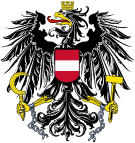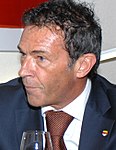
Back Eleccions legislatives austríaques de 1999 Catalan Nationalratswahl in Österreich 1999 German Elecciones generales de Austria de 1999 Spanish 1999. aasta Austria parlamendivalimised Estonian Élections législatives autrichiennes de 1999 French Elezioni parlamentari in Austria del 1999 Italian Oostenrijkse parlementsverkiezingen 1999 Dutch Wybory parlamentarne w Austrii w 1999 roku Polish Eleições legislativas na Áustria em 1999 Portuguese Парламентские выборы в Австрии (1999) Russian
| |||||||||||||||||||||||||||||||||||||||||||||||||||||||||||||||||
All 183 seats in the National Council 92 seats needed for a majority | |||||||||||||||||||||||||||||||||||||||||||||||||||||||||||||||||
|---|---|---|---|---|---|---|---|---|---|---|---|---|---|---|---|---|---|---|---|---|---|---|---|---|---|---|---|---|---|---|---|---|---|---|---|---|---|---|---|---|---|---|---|---|---|---|---|---|---|---|---|---|---|---|---|---|---|---|---|---|---|---|---|---|---|
| Turnout | 80.42% ( | ||||||||||||||||||||||||||||||||||||||||||||||||||||||||||||||||
| |||||||||||||||||||||||||||||||||||||||||||||||||||||||||||||||||
| |||||||||||||||||||||||||||||||||||||||||||||||||||||||||||||||||
| This article is part of a series on the |
| Politics of Austria |
|---|
 |
Parliamentary elections were held in Austria on 3 October 1999.[1] Although the Social Democratic Party remained the largest party in the National Council, a right-wing coalition government was formed by the Freedom Party of Austria (FPÖ) and the Austrian People's Party (ÖVP) after several months of negotiations. Although the FPÖ had finished a fraction of a point ahead of the ÖVP in the popular vote, ÖVP leader Wolfgang Schüssel became Chancellor rather than controversial FPÖ leader Jörg Haider. Haider, who had also been elected Landeshauptmann of Carinthia, was not appointed to the cabinet and resigned as party leader.[2]
However, foreign governments remained critical of the FPÖ's inclusion in the government and the fourteen other member countries of the European Union imposed sanctions on the country, whilst domestically the government faced protests organised by the SPÖ and Greens.[2] However, this pressure on the government helped stabilise it and when it became clear that the FPÖ was not going to be excluded from government, sanctions were lifted.[2]
Voter turnout was 80.4%.[3]
- ^ Dieter Nohlen & Philip Stöver (2010) Elections in Europe: A data handbook, p196 ISBN 978-3-8329-5609-7
- ^ a b c Nohlen & Stöver, p179
- ^ Nohlen & Stöver, p217







